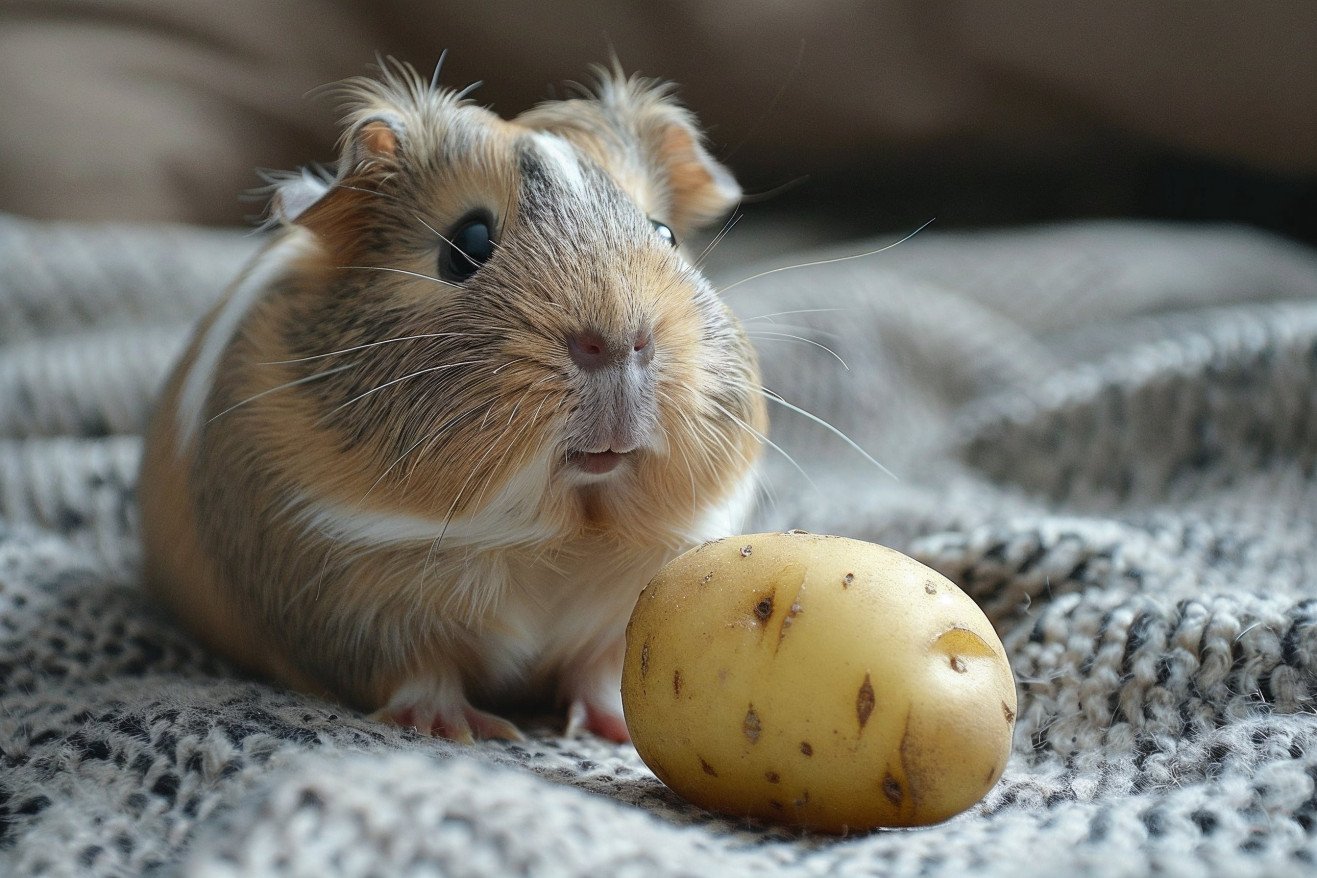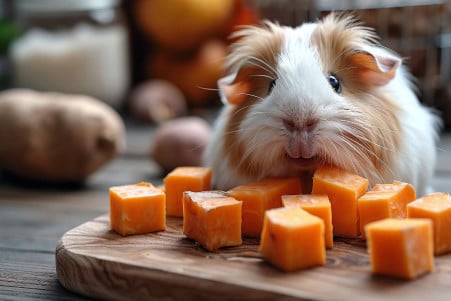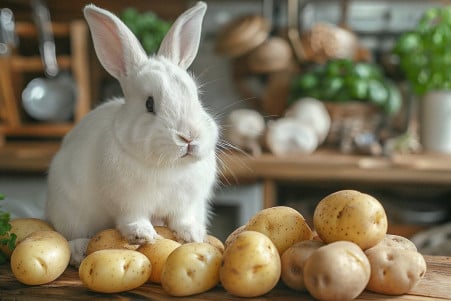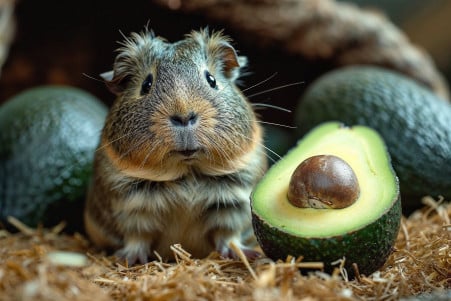Can Guinea Pigs Eat Potatoes? The Risks Explained
19 March 2024 • Updated 17 March 2024

Potatoes are a common food in human diets, but their place in a guinea pig’s diet is a little more complicated. Guinea pigs cannot eat potatoes. Potatoes contain solanine, a toxic alkaloid that is harmful to guinea pigs and can cause digestive upset and lethargy. In addition, the high starch content in potatoes can cause severe digestive problems in guinea pigs.
To better understand why potatoes are bad for guinea pigs, we’ll cover a range of veterinary perspectives and nutritional studies. We’ll also look at research on guinea pigs’ digestive physiology, their dietary requirements, and the potential dangers of certain foods. With this foundational knowledge, you’ll have the tools to make the best dietary decisions for your small pet’s health and happiness.
Can guinea pigs eat potatoes?
What Guinea Pigs Need from Their Diet
Guinea pigs are herbivores, so they need a diet that is high in fiber. This is important for their digestive system and their teeth, which grow constantly. To make sure that they get enough fiber, guinea pigs should eat lots of hay and fresh vegetables. The RSPCA recommends that hay should be available to guinea pigs at all times and make up the majority of their diet.
Guinea pigs also need vitamin C, which they can’t produce on their own. According to research on the NCBI Bookshelf, guinea pigs are one of the few mammals that can’t synthesize vitamin C and must get it from their diet. A lack of vitamin C can cause a number of health problems, including scurvy.
To avoid deficiencies, FOUR PAWS International suggests feeding guinea pigs a mix of high-vitamin C vegetables and fruits, such as kale, broccoli, and bell peppers, as well as guinea pig pellets.
By knowing what guinea pigs need from their diet, owners can make sure that their pets are getting everything they need to be healthy and happy, as well as avoid foods that could be harmful, like potatoes, which contain antinutrients that are toxic to guinea pigs, as we’ll cover later.
The Toxicity of Solanine in Potatoes
Potatoes, especially the green parts and sprouts, contain solanine, a naturally occurring glycoalkaloid that can be toxic in high doses. A review in PubMed notes that solanine has been shown to produce a variety of symptoms in humans and animals, including gastrointestinal disturbances, nervous system disorders, and in some cases, death.
In animals like guinea pigs, the toxicity of solanine is even more severe because they have a lower ability to detoxify and excrete these types of substances than humans.
Symptoms of solanine poisoning in guinea pigs can include vomiting, diarrhea, and abdominal pain, as well as neurological symptoms like ataxia or tremors. A review in PMC on gastrointestinal diseases explains that even small changes in diet can lead to major health problems in guinea pigs, demonstrating how sensitive their digestive systems are.
The difference in toxicity levels between humans and guinea pigs is significant; while the doses of solanine that are toxic to humans are much higher, the doses that are toxic to smaller animals are much lower due to differences in metabolism and body size.
Because of the potential for solanine toxicity, it’s evident that potatoes are not a safe food for guinea pigs. Their susceptibility to the toxic effects of solanine means that their diets need to be carefully managed to prevent health issues.
Why Potatoes Are Dangerous for Guinea Pigs
There are a few reasons why potatoes, a staple in many people’s diets, are not safe for guinea pigs. The most important of these is that potatoes are high in starch, which guinea pigs can’t digest well. As herbivores with a digestive system that’s meant to process fibrous plant material, the starch in potatoes can lead to severe digestive upset, including bloating, gas, and pain, according to Oxbow Animal Health.
In addition, potatoes don’t contain the essential nutrients that guinea pigs need, including vitamin C, which they can’t produce on their own.
In the short term, feeding guinea pigs potatoes can lead to digestive problems and a loss of appetite. In the long term, a diet that includes potatoes can make existing nutritional deficiencies worse and potentially lead to other health problems.
Even small amounts of potato can lead to guinea pigs feeling sick and tired, according to Animal Bliss, while the consumption of potato leaves and sprouts can lead to changes in behavior or stool due to the presence of toxic substances, according to Small Pet Select.
Understanding the dangers of feeding potatoes to guinea pigs makes it clear how important it is to feed them a diet that’s full of safe, healthy foods that meet their specific nutritional needs. In doing so, we can make sure our pets get the nutrition they need without the risks that come with feeding them foods like potatoes.
Supporting Wellness with Safe Foods for Guinea Pigs
Instead of potatoes, there are many other fruits and vegetables that can give guinea pigs the nutrients they need without the potential health problems. For example, guinea pigs can get lots of Vitamin C from leafy greens like broccoli and kale, according to UK Pet Food. By making sure these options are available, owners can help prevent scurvy and other nutritional problems in guinea pigs, which will help ensure their health and happiness.
It’s also important to make sure that any new foods are introduced to guinea pigs slowly to avoid digestive issues. The Humane Society recommends that fresh produce is given daily, but in limited amounts—between 1/2 to one cup per guinea pig per day—to make sure that they stay balanced and don’t overeat.
When you look at these approved foods next to potatoes, it’s easy to see why they are better options; they are full of vitamins and low in starch, while potatoes are high in starch and can lead to health problems in guinea pigs.
By making sure these safer options are available, owners can make sure that their pets are getting the nutrients they need and sticking to the herbivorous diet that is natural for guinea pigs, which will help support their dental health and digestive system, according to a study published on ResearchGate.
By making sure that these vet-recommended options are available, owners can make sure that their pets are eating a diet that is similar to what they would eat in the wild, which will help them live a long and healthy life.
Key Takeaways: What This Means for Your Guinea Pig’s Diet
In short, potatoes are not safe for guinea pigs to eat and can have serious health consequences. As we’ve discussed, the combination of solanine, a toxic substance found in potatoes, and their high starch content can cause digestive and neurological problems in guinea pigs. This deep dive into guinea pig nutrition has made it clear that guinea pigs need a diet that’s high in fiber and vitamin C, two things that potatoes don’t provide.
Good pet ownership means that guinea pig owners need to do their homework and talk to their vets about the best diet for their pets. Knowing what guinea pigs need in their diet is important for preventing malnutrition and keeping them healthy.
Our pets’ health is in our hands, and we need to make sure we’re doing everything we can to keep them healthy. That means making sure we’re feeding them a diet that meets their specific nutritional needs, including the need for fiber and vitamin C. One way to do that is to make sure we’re not feeding them potatoes and instead feeding them foods that are safe and good for them.


